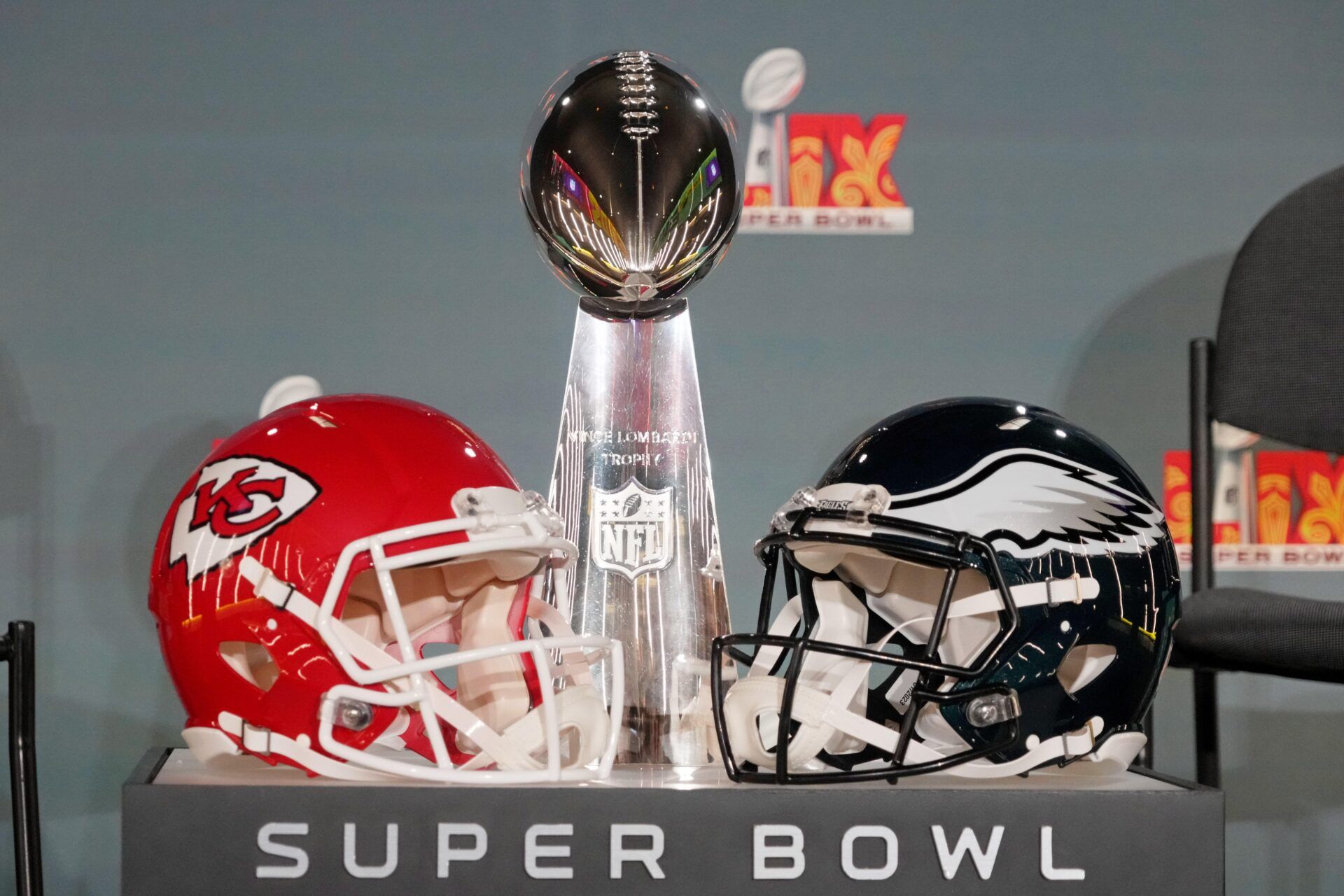Super Bowl Home Team: How Is It Determined? - NFL Explained
Ever wondered how the Super Bowl, the pinnacle of American football, decides who gets the coveted title of "home" team, even when the game is played on neutral ground? The answer, surprisingly simple, is a tradition rooted in fairness and a touch of history: the home team designation alternates annually between the American Football Conference (AFC) and the National Football Conference (NFC) champions.
While the Super Bowl is famous for its neutral site, a specific team is always designated as the "home" team. This designation impacts several aspects, most notably the jersey color. Traditionally, the "home" team can choose to wear their home-colored jerseys, which can provide a psychological advantage. This tradition harks back to the early Super Bowls, where the home team was mandated to wear their home jerseys, adding a layer of visual identity to the game.
The genesis of this rotational system lies in the very beginnings of the Super Bowl era. In the inaugural Super Bowl, the Green Bay Packers, representing the NFC, were the home team. The following year, the Oakland Raiders, representing the AFC (then the American Football League, or AFL), were the home team. This alternating pattern was established from the outset and has been followed consistently ever since. This simple, yet effective, approach ensures that neither conference consistently enjoys a perceived advantage.
- Find Watch Free Movies Online Hdmovie2 Alternatives
- Elena Moussa Height Weight Body Stats What You Need To Know
This pattern isn't just a matter of aesthetics; it carries historical weight. In the vast history of the Super Bowl, the designated "home" team has emerged victorious 24 times. However, it is important to note that three of those victorious teams opted to wear their white away jerseys, suggesting the advantage is not as significant as one might assume.
Consider the recent history. In Super Bowl LVIII, which unfolded last February, the Kansas City Chiefs, representing the AFC, were designated as the "home" team. Now, looking ahead, the Philadelphia Eagles, the NFC champions, will be the designated "home" team for Super Bowl LIX, scheduled for February 9, 2025, at the Caesars Superdome in New Orleans, the official home of the New Orleans Saints.
The selection of the Super Bowl's host city is a process undertaken well in advance, providing ample time for preparation and planning. While the game is always played on a neutral site, the distinction of "home" team, with its symbolic implications, remains.
- Troubleshooting Google Search No Results Fixes For Common Issues
- Sung Hoon Ryu Hyun Kyung Split Dating Rumors Honest Revelations
In essence, the designation of the home team in the Super Bowl is a carefully maintained tradition. By alternating the designation annually between the AFC and NFC champions, the NFL aims to provide a fair and balanced atmosphere, ensuring that the spectacle of the Super Bowl remains focused on the competition and the unparalleled display of athletic prowess.
The Kansas City Chiefs, champions of the AFC, found themselves in the "home" team role during Super Bowl 58. This meant a familiar visual spectacle, with the Chiefs potentially donning their signature red and white uniforms, a sight many fans associate with their home field at Arrowhead Stadium. This instance marked only the second time since the 2019 season that the Chiefs have had this distinction in the Super Bowl.
The alternating system ensures fairness in the Super Bowl. Each year, one conference gets the advantage of being the "home" team, providing a balanced approach to the event. The NFL has maintained this structure since the inaugural Super Bowl, with the NFC being the home team in the first Super Bowl and the AFC taking the home team spot the following year.
The 2021 Super Bowl, played at Raymond James Stadium, saw the Tampa Bay Buccaneers, playing in their home stadium, as the designated "home" team. This occurred due to the alternating format. In essence, the alternating system is a key component of how the Super Bowl maintains its balance and tradition.
The upcoming Super Bowl LIX, to be held at Caesars Superdome in New Orleans, will feature the NFC champions as the home team. This rotation ensures that each conference has the chance to experience the symbolic benefits of the "home" team designation.
The Super Bowl's structure, especially regarding the "home" team, is a blend of fairness and tradition. With the home team alternating annually between the AFC and NFC, a balance is maintained. The history of the home team is also a fascinating aspect of the Super Bowl, providing context and depth to the game's legacy.
In the grand scheme of the Super Bowl, the "home" team designation is more than just a formality; its a nod to tradition and a commitment to fairness. As the game evolves, this simple rotational system helps maintain the integrity of the competition.
The Super Bowl is one of the most-watched sporting events in the world. It is a showcase of athleticism, strategy, and entertainment. Knowing the intricacies, such as how the "home" team is determined, adds to the viewing experience.
The designation of the "home" team adds to the Super Bowl's rich history. The rotational basis, alternating between the AFC and NFC champions, ensures balance and tradition, contributing to the game's allure.
The Super Bowl, with its tradition and fairness, offers a captivating spectacle. Knowing the specifics, like how the home team is chosen, enhances the Super Bowl's fascination.
The Super Bowl's neutral-site format and alternating home team designation is a core aspect of its appeal. This ensures a balanced playing field, maintaining the fairness that has been a part of the Super Bowl since its inception.
The Super Bowl continues to be a prime example of how tradition and fairness combine to create a spectacle that is admired worldwide.
The Super Bowl showcases top athleticism. The alternating home team designation is a testament to the NFL's effort to ensure a level playing field. The home team's history gives context to the game's rich legacy.
The Super Bowl's appeal lies in its balance of competition, tradition, and entertainment. The home team designation is a prime example of how tradition is upheld, and fairness is maintained.
The Super Bowl, a premier sporting event, uses a fair and traditional approach. The alternating home team designation and neutral site maintain the competition's integrity.
As the Super Bowl continues, the alternating home team designation ensures its appeal as a symbol of athletic achievement.
The Super Bowl is one of the worlds premier sporting events. The alternating home team designation ensures a level playing field and adds to the game's allure. The Super Bowl's rich history makes it a symbol of athletic achievement.



Detail Author:
- Name : Prof. Silas Hettinger II
- Username : marvin.dannie
- Email : idella.bernhard@gmail.com
- Birthdate : 1981-06-04
- Address : 923 Beatty Forges Jaceburgh, MD 57906-1716
- Phone : +1 (805) 783-9543
- Company : Considine-Murphy
- Job : Housekeeper
- Bio : Et similique exercitationem et omnis tempora ea. Neque possimus non illum sunt maiores. Rerum quod maiores eum officia. Cumque inventore non facere quisquam nobis molestiae illum.
Socials
tiktok:
- url : https://tiktok.com/@sdaniel
- username : sdaniel
- bio : Eaque itaque in voluptate impedit.
- followers : 3505
- following : 377
instagram:
- url : https://instagram.com/sdaniel
- username : sdaniel
- bio : Est modi minima illo nihil sed architecto esse sed. Inventore non doloremque rerum ut omnis.
- followers : 6440
- following : 2989
linkedin:
- url : https://linkedin.com/in/serenity_dev
- username : serenity_dev
- bio : Porro suscipit impedit autem quia.
- followers : 1006
- following : 2641
facebook:
- url : https://facebook.com/serenity_id
- username : serenity_id
- bio : Vitae odio tempora dicta dolor itaque voluptatum aut.
- followers : 1024
- following : 1612